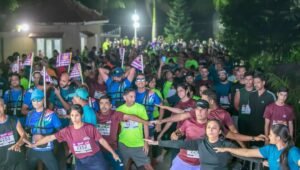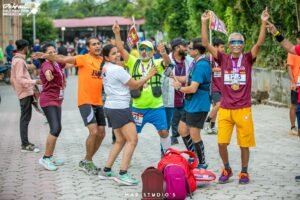The Importance of Hydration and Nutrition During a Marathon
Running a marathon is no easy task. It requires months of preparation, discipline, and mental strength. However, one thing that runners often overlook is the importance of hydration and nutrition. These two factors can make or break your marathon experience. Proper hydration and nutrition during a marathon are crucial to your performance and health, especially in India’s climate, where the heat and humidity can make things even more challenging. Let’s break down why these elements are so important and how to manage them effectively.
Why Hydration Matters
Our body is made up of about 60% water. During a marathon, we sweat a lot, especially in warm weather, and this leads to significant water loss. If we don’t replace the lost fluids, our body becomes dehydrated, which can have severe effects on our performance and health.
How Dehydration Affects Your Body
- Muscle Cramps: Lack of water can cause your muscles to cramp up, making it difficult to run. Many runners experience painful muscle cramps during the later stages of a marathon due to dehydration.
- Fatigue and Weakness: Dehydration can make you feel tired and weak. You may struggle to keep up your pace and feel exhausted much sooner than expected.
- Dizziness and Confusion: Severe dehydration can lead to dizziness or confusion, putting your safety at risk.
- Overheating: Water helps regulate your body temperature. Without enough hydration, your body may overheat, leading to serious health issues like heat stroke.
How Much Water Should You Drink?
It’s important to strike a balance between drinking enough water and not overhydrating. Drinking too much water can cause a condition called hyponatremia, where the sodium levels in your body drop too low, which can also be dangerous.
Here’s a general guideline:
- Drink 500 ml to 750 ml of water 2-3 hours before the marathon.
- During the race, aim to drink 100-150 ml every 15-20 minutes, depending on your sweat rate, weather conditions, and personal hydration needs.
Example:
Imagine you’re running the Delhi Half Marathon in the middle of winter. While the temperature might be cooler, you’ll still sweat as you run. Keeping small sips of water throughout the race will help you avoid fatigue, muscle cramps, and dizziness. At the water stations, take a few sips but don’t gulp down too much at once.

The Role of Nutrition During a Marathon
Nutrition is the fuel that powers your body throughout the race. Without the right fuel, your body will struggle to perform, especially during long races like half or full marathons.
What Happens If You Don’t Eat Enough?
- Hitting the Wall: “Hitting the wall” is a term used by marathoners to describe the point when your body runs out of energy, usually after 30-32 km of running. This happens when your body burns through all its glycogen (stored energy) and has no quick source of energy left.
- Lack of Focus and Energy: Without proper nutrition, your mental focus and physical energy will decline. You’ll feel sluggish and unable to keep up with the demands of the race.
What to Eat Before and During the Race
Carbohydrates are your body’s main source of fuel during a marathon. Here’s how you can manage your nutrition:
- Before the Race: Eat a carb-rich meal 3-4 hours before the marathon. Indian foods like poha, idli, upma, or dalia (broken wheat) are excellent choices. Avoid heavy, oily, or spicy foods as they can cause stomach discomfort.
- During the Race: For long races, your body will need extra energy during the marathon. Many runners use energy gels, bananas, or sports drinks that contain carbohydrates and electrolytes. Bananas, which are commonly available at marathon aid stations in India, provide quick energy and help prevent muscle cramps due to their potassium content.
- After the Race: After finishing, focus on refueling with a combination of carbohydrates and proteins. Simple Indian meals like dal-rice, paneer with roti, or vegetable pulao are good options to help your body recover.
Example:
Before running the Mumbai Marathon, you might have a breakfast of upma or idli, which is light yet packed with carbs. During the race, if you feel low on energy, a banana or energy gel can give you the boost you need to finish strong.
Electrolytes: Not Just Water, But Salts Too!
When you sweat, you lose more than just water—you also lose electrolytes, including sodium, potassium, and magnesium. Electrolytes are essential for muscle function and keeping your body’s fluids balanced. Without enough electrolytes, you could experience muscle cramps, fatigue, or dizziness.
How to Get Electrolytes During a Marathon:
- Drink sports drinks that contain electrolytes, especially on hot days.
- Eat foods like bananas or salted snacks that can help replenish lost sodium and potassium.
- You can also use electrolyte tablets that dissolve in water, which is a convenient way to stay hydrated and maintain your electrolyte balance.
Impact of Poor Hydration and Nutrition
Failing to properly hydrate or eat during a marathon can lead to poor performance or even serious health issues. Some common consequences include:
- Decreased Endurance: If you don’t stay hydrated or fueled, your body will tire faster, and you won’t be able to maintain your pace.
- Risk of Injury: Dehydration can cause muscle cramps, which may lead to injuries.
- Heat Stroke or Exhaustion: In India’s hotter climates, not drinking enough water can result in heat-related illnesses.
- Poor Recovery: Without proper nutrition, your body will take longer to recover after the marathon, causing soreness and fatigue for days.

Here are 10 Dos and Don’ts for hydration and nutrition during a marathon:
10 Dos
- Do hydrate regularly: Start drinking water 2-3 days before the marathon to ensure your body is well-hydrated.
- Do drink water in small sips: During the race, drink small amounts at regular intervals (every 15-20 minutes) to avoid dehydration without overloading your stomach.
- Do eat a balanced meal before the race: Have a carbohydrate-rich meal (like poha, upma, or idli) 3-4 hours before the race for sustained energy.
- Do carry energy gels or snacks: Pack easy-to-digest snacks like energy gels, bananas, or dry fruits to boost energy levels during the race.
- Do include electrolytes: Drink sports drinks with electrolytes, especially in hot weather, to replace lost salts and prevent cramps.
- Do listen to your body: If you feel lightheaded, dizzy, or weak during the race, slow down and hydrate immediately.
- Do plan your race-day nutrition: Practice your marathon-day eating and drinking strategy during training to avoid surprises.
- Do refuel after the race: Have a meal with carbs and protein within 30 minutes after finishing to help your muscles recover.
- Do consider the weather: Adjust your hydration plan based on the weather. Drink more fluids on hot and humid days.
- Do train with your race-day nutrition plan: Make sure you practice eating and drinking the same foods and drinks during training that you plan to use on race day to avoid stomach upsets.
10 Don’ts
- Don’t wait until you’re thirsty to drink: Thirst is a late sign of dehydration. Drink at regular intervals during the race.
- Don’t drink too much water at once: Gulping down large amounts of water can lead to bloating or hyponatremia (low sodium levels).
- Don’t try new foods on race day: Avoid eating anything new or unfamiliar right before or during the marathon to prevent stomach issues.
- Don’t skip breakfast: Running on an empty stomach can lead to fatigue and poor performance. Have a light, balanced meal before the race.
- Don’t over-rely on water alone: Hydrating with only water can cause electrolyte imbalances. Make sure to drink sports drinks or eat foods rich in sodium and potassium.
- Don’t ignore early signs of dehydration: Dizziness, headaches, or dry mouth are signs that you need to hydrate immediately.
- Don’t overeat before the race: A heavy meal can sit in your stomach, making you feel sluggish and uncomfortable during the run.
- Don’t rely on race-day hydration stations alone: Carry your own water bottle or hydration pack if needed, especially for longer runs or if you prefer a particular brand of hydration drink.
- Don’t ignore recovery nutrition: After the race, don’t wait too long to eat. Your muscles need carbs and protein to recover effectively.
- Don’t skip electrolyte intake: Just drinking water may not be enough. Include electrolyte tablets or sports drinks to maintain the right balance of fluids and salts.
Marathons are as much about preparation as they are about running. If you focus on your hydration and nutrition, you’ll not only feel better during the race but also perform at your best. Whether you’re running in Mumbai, Delhi, or any part of India, following these guidelines can help you stay strong and finish the race with a smile!
By paying attention to hydration and nutrition, you’re giving your body the tools it needs to cross the finish line feeling energized and healthy.
